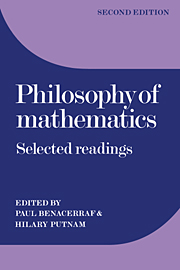Book contents
- Frontmatter
- Contents
- Preface to the second edition
- Introduction
- Part I The foundations of mathematics
- Part II The existence of mathematical objects
- Part III Mathematical truth
- The a priori
- Truth by convention
- Carnap and logical truth
- On the nature of mathematical truth
- On the nature of mathematical reasoning
- Mathematical truth
- Models and reality
- Part IV The concept of set
- Bibliography
Models and reality
Published online by Cambridge University Press: 05 June 2012
- Frontmatter
- Contents
- Preface to the second edition
- Introduction
- Part I The foundations of mathematics
- Part II The existence of mathematical objects
- Part III Mathematical truth
- The a priori
- Truth by convention
- Carnap and logical truth
- On the nature of mathematical truth
- On the nature of mathematical reasoning
- Mathematical truth
- Models and reality
- Part IV The concept of set
- Bibliography
Summary
In 1922 Skolem delivered an address before the Fifth Congress of Scandinavian Mathematics in which he pointed out what he called a “relativity of set-theoretic notions”. This “relativity” has frequently been regarded as paradoxical; but today, although one hears the expression “the Löwenheim-Skolem Paradox”, it seems to be thought of as only an apparent paradox, something the cognoscenti enjoy but are not seriously troubled by. Thus van Heijenoort writes, “The existence of such a ‘relativity’ is sometimes referred to as the Löwenheim-Skolem Paradox, but, of course, it is not a paradox in the sense of an antinomy; it is a novel and unexpected feature of formal systems.” In this address I want to take up Skolem's arguments, not with the aim of refuting them but with the aim of extending them in somewhat the direction he seemed to be indicating. It is not my claim that the “Löwenheim-Skolem Paradox” is an antinomy in formal logic; but I shall argue that it is an antinomy, or something close to it, in philosophy of language. Moreover, I shall argue that the resolution of the antinomy – the only resolution that I myself can see as making sense – has profound implications for the great metaphysical dispute about realism which has always been the central dispute in the philosophy of language.
- Type
- Chapter
- Information
- Philosophy of MathematicsSelected Readings, pp. 421 - 444Publisher: Cambridge University PressPrint publication year: 1984
- 2
- Cited by



